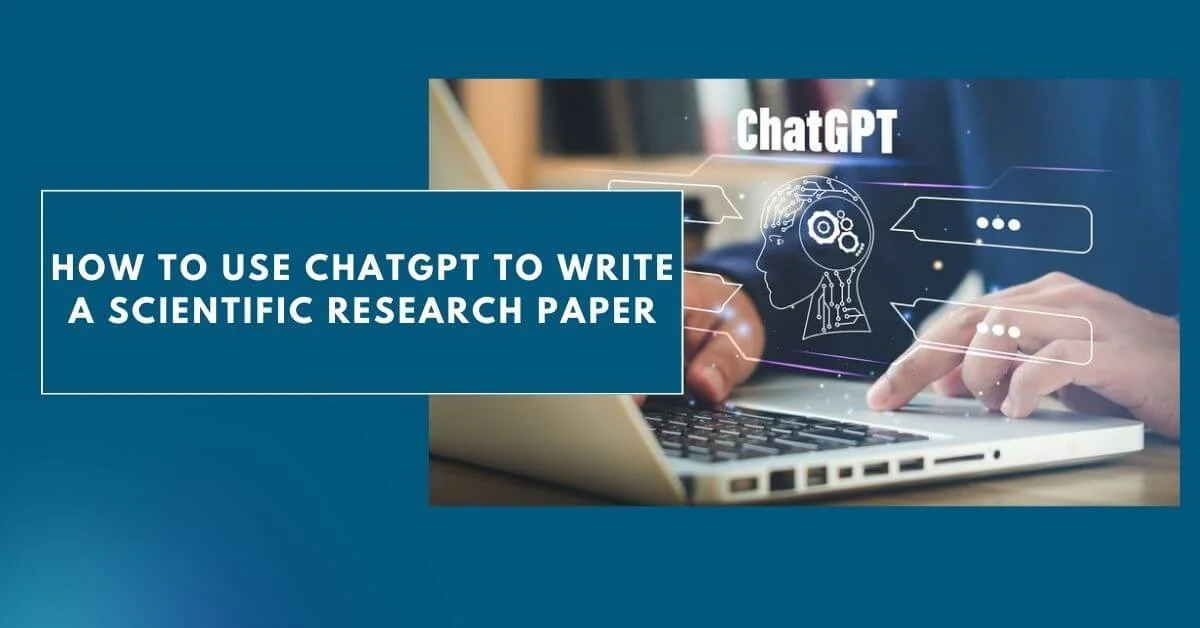The writing of scientific research papers has undergone significant advancements in the era of artificial intelligence (AI), facilitated by tools such as OpenAI’s ChatGPT, which provide advanced language comprehension and generation functionalities.
This advanced artificial intelligence model can provide support at multiple points in the scientific writing process, spanning from the preliminary draft to the ultimate revisions. The objective of this article is to provide a clear explanation of how to efficiently utilize ChatGPT while composing a scientific research paper.
How to Use ChatGPT to Write a Scientific Research Paper
1. Understanding ChatGPT Capabilities
ChatGPT is an OpenAI-developed language model. Language comprehension, content generation, summarization, text modification, and fact verification are among its capabilities. However, it is not without its drawbacks, including intermittent imprecision, excessive verbosity, and the potential to produce plausible yet erroneous or illogical answers. To utilize ChatGPT effectively in scientific writing, its capabilities must be supplemented with human discernment and expertise.
2. Pre-Writing Stage
Determining the Research Question: ChatGPT possesses the capability to serve as a potent instrument for generating ideas. By inputting the query “Generate ideas for a research paper on [topic],” one can solicit a wide range of viewpoints and potential inquiries for the paper.
When conducting a comprehensive literature review, ChatGPT’s capability to summarize articles can be particularly beneficial. The command “Summarize the following article: [link/article text]” can be utilized for this objective.
In the process of developing the research design, one may employ ChatGPT as a tool to generate concepts. Implement directives such as “Demonstrate a research design for an investigation about [subject].”
3. Writing the Research Paper
It is essential to have an engaging introduction. One can acquire a preliminary version of an introduction for a research paper on a given topic by instructing ChatGPT to compose the introduction.
ChatGPT can assist in the elaboration of your research methodologies in the methods section. Commands such as “Explain the research method [method]” can produce comprehensive explanations.
The presentation of results in a succinct and comprehensible manner can pose a significant challenge. The following results can be displayed via ChatGPT using the command “Present the following results: [results].”
The discussion section is crucial for interpreting the results and establishing a connection to your research question. The command “Discuss the implications of these results: [results]” can be utilized to assist with ChatGPT.
Final Segment: ChatGPT can use the command “Summarize the key findings of a research study on [topic]” to summarize the obtained results.
Reference management can be a complex undertaking; however, ChatGPT can assist by formatting references in particular styles when instructed to do so (provide the command “Format the following references in [specific style]”).
4. Post-Writing Stage
Editing and Proofreading the Paper: ChatGPT facilitates editing and proofreading.
Utilize the “Proofread and edit the following text: [text]” command to obtain recommendations for stylistic and grammatical improvements.
Facilitating the Response to Reviewers’ Comments: ChatGPT can assist in comprehending and addressing feedback. It is capable of generating responses and interpreting remarks in response to the request “Assist me in comprehending and addressing the subsequent feedback: [feedback].”
Check Also: How to Use ChatGPT to Summarize a Research Paper | Extreme Guide
Benefits of ChatGPT to Write a Scientific Research Paper:
- Content Production: ChatGPT can produce content for a range of research paper sections, such as the introduction, literature review, and discussion. It can serve as an initial reference for organizing and conceptualizing data.
- The Expansion of Ideas: ChatGPT can be of assistance in augmenting ideas, proposing related concepts or studies, and providing additional insights when a general concept or outline is available.
- Sophisticated Language: By using ChatGPT, you can improve the language and style of writing in a research paper, making sure it is clear, follows a logical path, and follows the rules of academic writing.
- Error and Syntax Verification: By aiding in the detection and correction of grammatical and syntactical errors, the model enhances the overall caliber of the writing.
- The provision of citation assistance: With the assistance of ChatGPT, you can ensure that the information you include in your paper is properly cited by suggesting suitable citations.
- Rapid Drafting: It can prove advantageous in expeditiously composing segments of the paper, particularly when one must commit preliminary concepts to the paper before their further development.
- How to Conquer Writer’s Block: If one encounters writer’s block or encounters difficulty with a specific segment, ChatGPT can offer recommendations or alternative methodologies for approaching the material.
- Subject Investigation: ChatGPT can provide valuable assistance during the initial phases of research by generating potential research directions through ideation and proposing pertinent topics or keywords.
- Time Effectiveness: One can allocate more time to critical aspects of the research, such as analysis and interpretation, by utilizing ChatGPT during the writing process.
- Ensuring Accessibility: The online availability of ChatGPT enables users to access it from any location. This can be advantageous when working on research papers or collaborating across multiple platforms.
Commonly Used Commands for ChatGPT in Scientific Writing
| Stage | Task | Command |
|---|---|---|
| Pre-writing | Brainstorming | “Generate ideas for a research paper on [topic]” |
| Pre-writing | Summarizing articles | “Summarize the following article: [link/article text]” |
| Writing | Generating an introduction | “Write an introduction for a research paper on [topic]” |
| Writing | Elaborating methods | “Explain the following research method: [method]” |
| Writing | Presenting results | “Present the following results: [results]” |
| Writing | Writing a discussion | “Discuss the implications of these results: [results]” |
| Writing | Writing a conclusion | “Summarize the key findings of a research on [topic]” |
| Writing | Managing references | “Format the following references in [specific style]” |
| Post-writing | Proofreading and editing | “Proofread and edit the following text: [text]” |
| Post-writing | Responding to reviewers’ comments | “Help me understand and respond to the following feedback: [feedback]” |
Conclusion:
ChatGPT can, in conclusion, serve as a valuable resource when composing a scientific research paper. Although it cannot fully supplant human expertise and judgment, its proper application can greatly facilitate the process.
The ongoing development of AI will undeniably influence the trajectory of scientific writing in the coming years, with innovations such as ChatGPT offering promising avenues for further investigation.
People Also Ask:
-
Can I use ChatGPT for my research paper?
You can use generative AI tools like ChatGPT to formulate a potential outline to help guide your research. You can be as specific as you like, giving an overview of your research objectives, main arguments, and any evidence you intend to include in your paper.
-
Can I use AI to write a research paper?
The process of writing a research paper is a technical exercise for students and researchers that requires logical organization of a large amount of data and formatting. The development of AI and natural language processing (NLP) has led to the creation of new tools that can assist with this process.
-
How is ChatGPT used in scientific research?
ChatGPT and other AI chatbots can help by curtailing the amount of time spent finding sources, allowing you to jump more quickly to the actual reading and research portion of your work.







